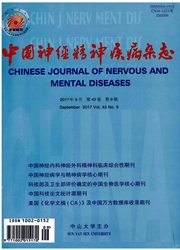

 中文摘要:
中文摘要:
背景急性脑损伤及其预后的影响因素是多方面的,如年龄、损伤程度与患者体质情况等,但其对外伤性脑损伤的预后结局仅作部分预测。近年来,有关遗传因素对脑损伤的影响和其预后的报道开始增多,关于载脂蛋白E在颅脑外伤预后中所起作用已引起人们的关注。在国外以往的研究中,关于载脂蛋白E基因多态性和脑损伤预后的研究结果也不相同。本研究初步探讨有关我国急性脑损伤及其预后与APOE基因之间的关系。方法采用病例对照研究,选取94名车祸脑损伤患者和正常人作为研究对象,采用聚合酶链式反应(PCR)限制性片段长度多态性(RFLP)方法鉴定载脂蛋白E(APOE)基因型,探讨其等位基因及基因型同车祸脑损伤及其预后的关系。结果车祸脑损伤患者中其等位基因ε2频率为0.1010,其基因型ε2/ε3的频率为0·1596明显高于正常人群ε2等位基因频率0.0050,及ε2/ε3基因型的频率0.0100(P〈0.05)。同时,患者中,其未愈死亡组中ε2等位基因频率为0.1970及ε2/ε3基因型的频率为0.2727,明显高于好转治愈组ε2等位基因频率0.0508及ε2/ε3基因型的频率0.1017(P〈0.05),有统计学意义。结论APOE基因的等位基因ε2基因型ε2/ε3初步可作为预示不良的预后参数。
 英文摘要:
英文摘要:
Background To explore the relationship between polymorphism of APOE gene in traumatic brain injury(TBI) patients suffering from traffic accident and the outcome of TBI. Methods TBI patients were randomly selected in this study with caxe-wntrol trial. The genotype of APOE allele was tested by a polymerase chain reaction-restriction fragment length polymorphism (PCR-RFLP), and the association between different genotypes of APOE alleles and outcome of TBI patients, were analyed. Results In TBI group frequency of APOE ε2 allele was 0. 1010, and frequency of APOE ε2/ε3 was 0. 1596. Both of these results were significantly higher than that in normal people (APOE epsilon 2 was 0. 0050, APOE ε2/ε3 was 0. 0100) ( P〈0. 05). Frequency of APOE ε2 and APOE ε2/ε3 in TBI group who died was 0. 1970 and 0. 2727. These were significantly high compared to TBI patients who had good recovery. Conclusions APOE allele ε2 and APOE genotype ε2/ε3alleles indicate a poor prognosis of traumatic brain injury patients.
 同期刊论文项目
同期刊论文项目
 同项目期刊论文
同项目期刊论文
 期刊信息
期刊信息
